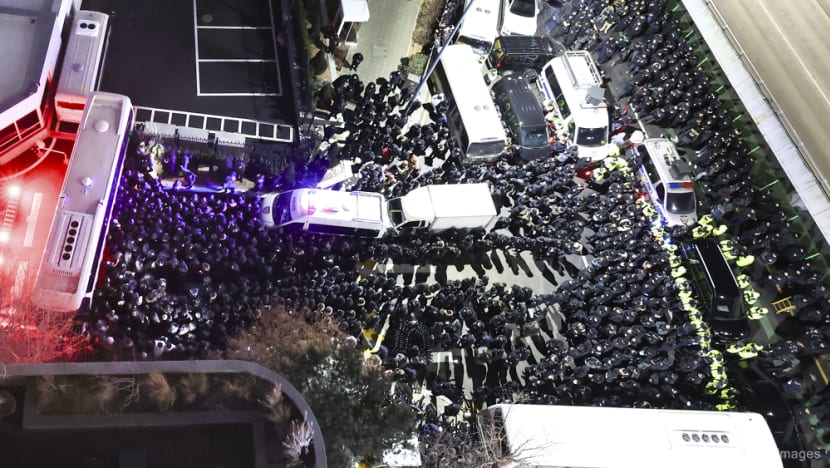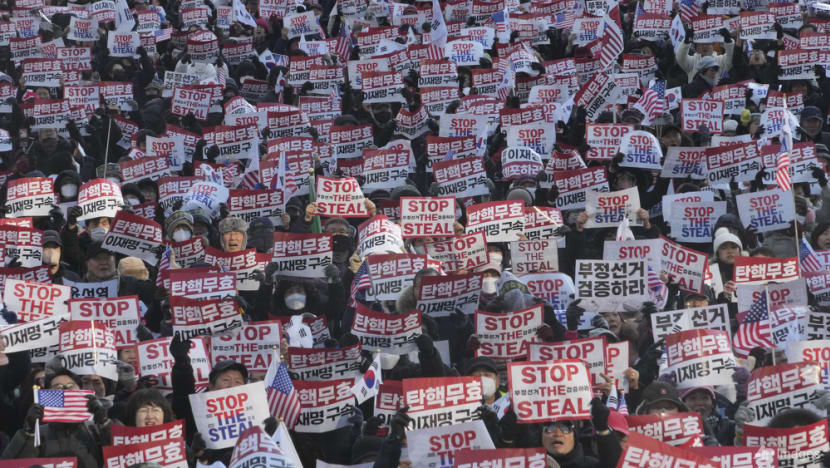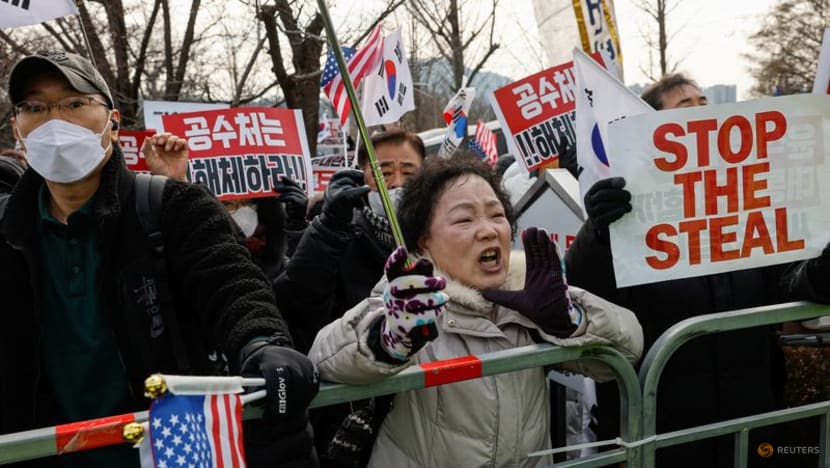Advertisement
Yoon Suk Yeol has so far refused to talk with investigators who had prepared a questionnaire of more than 200 pages, according to the Corruption Investigation Office for High-ranking Officials.

Impeached South Korean President Yoon Suk Yeol, center, sits in a car as he heads to a detention center in Uiwang, South Korea, Wednesday, Jan. 15, 2025. (Kim Sung-min/Yonhap via AP)
New: You can now listen to articles. 
This audio is generated by an AI tool.

16 Jan 2025 06:18PM (Updated: 16 Jan 2025 06:24PM)
Detained South Korean President Yoon Suk Yeol’s refusal to talk to anti-corruption officials is a move to delegitimise the investigation and drag out the process, observers told CNA.
This comes after his arrest on Wednesday (Jan 15) that ended a weeks-long standoff with authorities over his failed martial law declaration last month.
The 64-year-old failed to show up for a second day of questioning on Thursday due to health reasons, his legal team said, delaying a probe into whether he committed insurrection with his martial law bid.
REFUSING TO TALK
Up until Thursday afternoon, Yoon had refused to talk with investigators who had prepared a questionnaire of more than 200 pages, said an official from the Corruption Investigation Office for High-ranking Officials (CIO) that is heading the criminal inquiry.
Yoon, the first sitting South Korean president to be arrested, earlier said he turned himself in to prevent the risk of “unsavoury bloodshed”, though he continued to protest that it was an illegal investigation and invalid arrest warrant.
His lawyers have said the arrest warrant was issued by a court in the wrong jurisdiction and the team set up to investigate him does not have the legal mandate to do so.
Experts believe his legal team is dragging out the investigations to his benefit.
Jong Eun Lee, assistant professor of political science at North Greenville University, said his silence is a tactic “to delegitimise the authority of the CIO’s interrogation”.

However, some observers stressed that Yoon’s refusal to cooperate will not help him in any way.
“The general consensus is that there’s enough evidence gathered over the past month and a half to first detain him, to indict him and then in court to convict him,” said Hwang Kyung Moon, Korea Foundation professor at the Australian National University.
“There’s a very good chance, unless he is pardoned sometime down the line, that yesterday was the last day of his life in which he spends out of jail,” he told CNA’s Asia First.
Authorities have 48 hours to question the suspended president, after which they must release him or seek a warrant to detain him for up to 20 days.
Analysts believe investigators will not wait for the deadline to be up before making a court request for a formal warrant and extend his detention.
That seems to be the next strategy of the CIO, Lee told CNA938, adding that legal analysts have predicted that the court would most likely approve the extension.
A VICTIM OF INJUSTICE?
South Korea is grappling with its worst political crisis in decades, sparked by Yoon’s brief attempt to impose martial law on Dec 3. He claimed he needed to safeguard the nation “from the threats posed by North Korea’s communist forces and eliminate anti-state elements”.
Yoon deployed troops to parliament, but lawmakers defied them and voted down the move. He revoked martial law after just six hours and was subsequently impeached by parliament.
He then evaded arrest for weeks by remaining in his residential compound, protected by loyal members of the Presidential Security Service.
Lee said Yoon’s lawyers are expected to continue the argument that his martial law declaration “was executed lawfully, without unlawful abuse of power” and that “they have made the decision based on credible concerns”.

Observers believe the president is now trying to portray himself as a victim of injustice.
“He’s trying to evoke political sympathy, trying to make himself a victim and the CIO or opposition party as the aggressor,” said Lee.
He said the vast majority of conservative lawmakers and conservative South Korean citizens have been rallying around Yoon.
“(This is) either because they believe his martial law declaration was justified, or maybe the martial law declaration was impetuous (and) reckless but they still believe that the national assembly and opposition parties have gone too far in trying to impeach the president.”
“POLITICALLY, HE’S DEAD”
Recent opinion polls have suggested a rebound in public support for Yoon and the ruling People Power Party (PPP).
“He seems to be trying to win this battle through shaping public opinion, through trying to get the conservative base on his side, and at the same time essentially trying to delegitimise the investigation as well as the impeachment,” said Mason Richey, associate professor of international politics at the Hankuk University of Foreign Studies.
But “politically, he’s dead”, Richey told CNA’s Asia Now.
A significant portion of the population continues to call for Yoon’s removal from office, noted analysts.
The rebound for the PPP is largely due to conservatives not wanting the liberal leader of the main opposition Democratic Party, Lee Jae-myung, to win the special presidential elections if Yoon were removed from power by the Constitutional Court, Richey said.

Lee was convicted last November of violating election law.
“So a lot of conservatives are trying to strategise this in such a way that Lee Jae-myung won’t be able to run for president in the special election,” said Richey.
“Yoon himself, however, is politically dead. I think he committed political suicide on Dec 3 (when he declared martial law).”
Yoon’s refusal to cooperate with investigators comes as the Constitutional Court is due to hold a second hearing in his impeachment trial to determine whether to remove him permanently or reinstate his presidential powers.
If the court decides that the impeachment is legal and valid, Yoon will be removed from office, triggering a presidential election within 60 days.
Hwang said: “If everything goes according to this tentative schedule, we could have a presidential election in perhaps late April or May, and then we would have a new president in office by June or July.”
